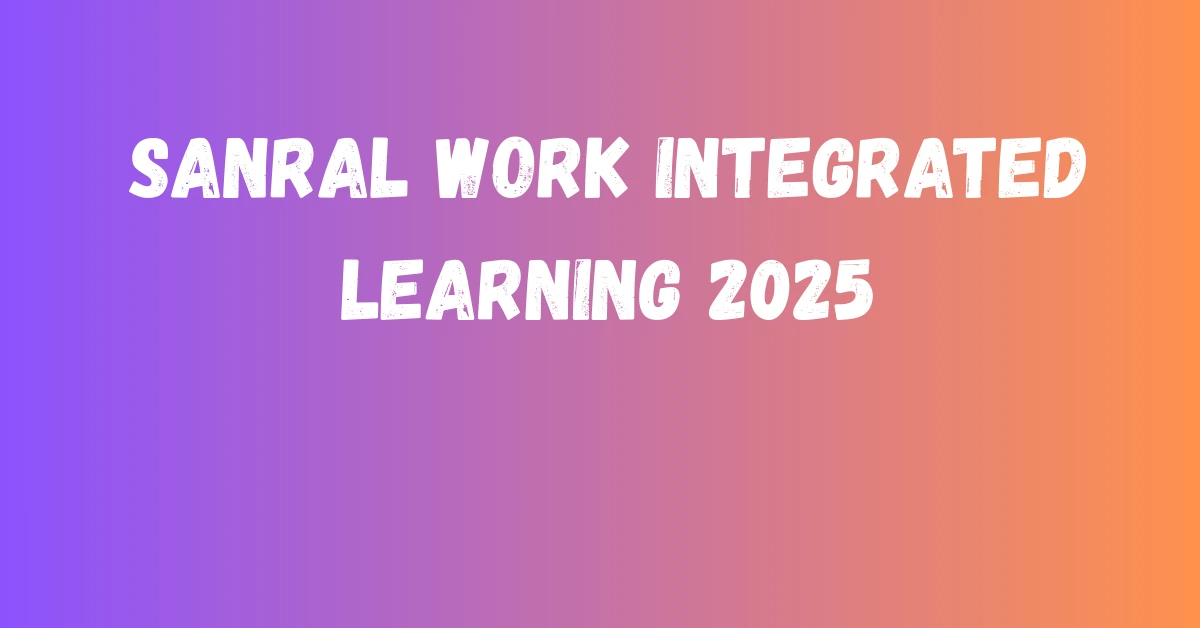SANRAL Work Integrated Learning: On a sunny morning in South Africa, a group of civil engineering students gather at the edge of a massive construction site. They’re wearing hard hats and reflective vests, their boots dusted from the red earth. Towering cranes lift concrete beams into place, surveyors adjust tripods, and the steady hum of machinery fills the air.
Among them is Thabo, a final-year Civil Engineering student, holding a set of site drawings. Just months ago, he was in a lecture hall, learning about road design principles. Today, he’s standing on the very ground where those principles are being put into action—thanks to SANRAL’s Work Integrated Learning (WIL) programme.
This is more than a training placement. It’s the bridge between theory and practice, between aspiration and achievement.
Understanding SANRAL’s Work Integrated Learning
The South African National Roads Agency (SANRAL) is more than just a government body—it’s the custodian of our national road network. From the busiest freeways to the most remote rural routes, SANRAL is responsible for planning, building, upgrading, and maintaining the infrastructure that keeps South Africa moving.
As the demand for modern, safe, and sustainable roads grows, so does the need for skilled engineers who can design, manage, and maintain them. This is where SANRAL’s Work Integrated Learning initiative steps in—an opportunity for students to step out of the classroom and into the heart of the nation’s most important infrastructure projects.
What Work Integrated Learning Really Means
Work Integrated Learning is not just “work experience.” It’s a structured programme where academic learning is merged with real-world application. For engineering students, this means:
- Gaining hands-on exposure to tools, technologies, and processes.
- Understanding how projects are managed from conception to completion.
- Developing professional skills—from communication to problem-solving—that textbooks can’t fully teach.
In short, it’s where future engineers learn to think and act like professionals.
The SANRAL WIL Framework: Purpose and Approach
SANRAL’s WIL programme is built around two key goals:
- Developing South Africa’s engineering talent pipeline.
- Addressing the country’s infrastructure skills gap.
The agency offers several types of placements to suit different stages of a student’s education:
- Internships – Multi-month placements offering deep immersion in engineering work.
- Vacation Work – Short-term roles during academic breaks for quick exposure.
- Learnerships – Structured, longer-term training combining theory with technical skill development.
Whether on-site supervising roadworks, in the design office drafting plans, or in the lab testing materials, each student’s placement is tailored to match their academic background and career aspirations.
Why a SANRAL WIL Placement is a Career Game-Changer
SANRAL Work Integrated Learning
1. Real-World Engineering Experience
Imagine watching a new highway take shape under your guidance. One day you’re learning about asphalt mix designs in class, the next you’re testing those mixes on-site. At SANRAL, students work on projects that impact communities, commerce, and connectivity.
From using advanced surveying equipment to assisting in traffic flow studies, the scope of work ensures students leave with both technical competence and practical confidence.
2. A Head Start on Career Opportunities
Having SANRAL on your CV is more than a line—it’s a stamp of credibility. Employers know SANRAL placements involve real responsibility, not just observation. This makes graduates with WIL experience highly sought after in the engineering and construction sectors.
3. Building Professional Networks
During their placements, students work alongside experienced civil engineers, project managers, environmental specialists, and contractors. These connections often lead to future job offers, mentorships, and collaborative opportunities.
4. Pathways to Full-Time Employment
Many WIL participants transition directly into graduate positions at SANRAL or with its partner companies. Hard work and strong performance during your placement can literally pave your way to a permanent role.
Who Can Apply? Eligibility and Requirements
SANRAL’s WIL opportunities are open to students who meet specific criteria:
- Academic Background – You must be enrolled in a relevant qualification such as Civil Engineering, Construction Management, or Geotechnical Engineering.
- Progress in Studies – Many placements are aimed at students in their final year or those who have completed a certain portion of their coursework.
- Nationality – Applicants are usually required to be South African citizens or permanent residents.
- Skills and Personal Attributes – Problem-solving ability, teamwork, adaptability, and a genuine interest in civil engineering are key.
How to Apply: Step-by-Step
- APPLY FOR THE SANRAL FINANCE INTERNSHIP OPPORTUNITIES HERE – CLOSING 15 AUG
- APPLY FOR THE SANRAL TRANSFORMATION INTERNSHIP OPPORTUNITIES HERE – CLOSING 14 AUG
- Prepare Your Documents – These typically include:
- Updated CV
- Certified copy of your ID
- Academic transcripts
- Motivational letter explaining why you want the placement
- Submit Your Application – Follow the instructions in the job listing carefully. Late or incomplete applications are usually not considered.
- Prepare for Assessments – Shortlisted candidates may be invited to interviews, technical tests, or group exercises.
- Ace the Interview – Be ready to discuss your academic projects, problem-solving experiences, and interest in SANRAL’s work.
A Day in the Life of a SANRAL WIL Student
On-site before 8 a.m., Naledi starts her day reviewing progress reports for a road-widening project. By mid-morning, she’s supervising asphalt compaction tests with the quality control team. After lunch, she’s back in the office, assisting engineers in updating CAD drawings and compiling compliance reports.
Every day is different—but every task is connected to real projects with real impact. This variety not only sharpens technical skills but also teaches adaptability, a vital trait in the fast-paced world of infrastructure development.
The Broader Impact: How WIL Shapes South Africa’s Engineering Future
Developing Leaders, Not Just Workers
By giving students decision-making responsibilities and exposure to high-stakes projects, SANRAL is cultivating the next generation of engineering leaders.
Driving Socio-Economic Development
Beyond personal career growth, WIL placements contribute to the country’s development goals:
- Enhancing infrastructure quality and efficiency.
- Creating skilled employment opportunities.
- Supporting local communities through better connectivity.
Promoting Innovation
Fresh perspectives from students often lead to creative solutions for technical challenges—something every engineering project can benefit from.
Expert Voices: Why WIL Matters
“The WIL programme is where classroom knowledge meets the dust of the construction site. It’s where potential turns into capability,” says a senior SANRAL project manager.
“We’ve seen interns return as qualified engineers leading their own teams. That’s the true measure of success for us,” adds a human resources coordinator at SANRAL.
Tips for a Successful WIL Experience at SANRAL
- Be proactive – Don’t wait to be told what to do; ask how you can contribute.
- Take notes – Field experience is full of learning moments worth recording.
- Network – Introduce yourself to as many professionals as possible.
- Ask questions – Curiosity shows engagement and a willingness to learn.
- Reflect – Use each day to connect practical work with your academic learning.
Conclusion: From Classroom to Construction Site
SANRAL’s Work Integrated Learning programme is not just about filling a student’s calendar—it’s about filling the country’s future with skilled, inspired, and capable engineers.
For students, it’s the chance to:
- Turn theory into practice.
- Gain career-defining experience.
- Build a network that can support a lifetime in engineering.
For South Africa, it’s an investment in the very roads—both literal and figurative—that will carry the nation forward.
So, if you’re studying engineering and dreaming of making a tangible difference, start exploring SANRAL’s WIL opportunities. The road to your future might just begin on one of theirs.


